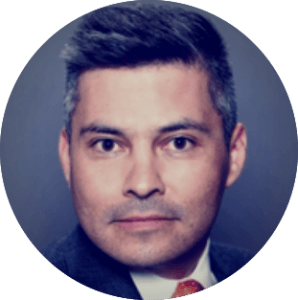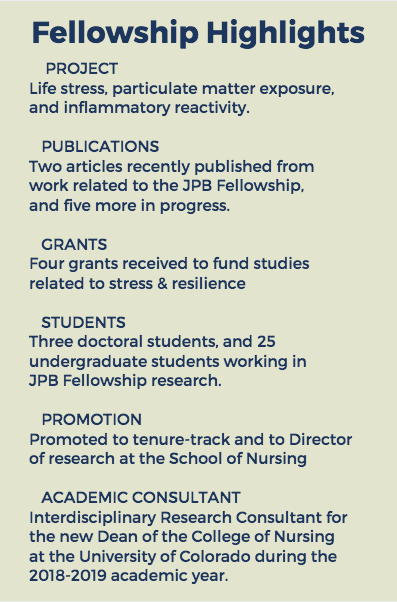Hector Olvera, Associate Professor and Director of Research School of Nursing University of Texas at El Paso (Senior Fellow 2014-2017) shares how the JPB EH Fellowship became a transformational support in his career.
 The Fellowship and His Career Goals
The Fellowship and His Career Goals
Thanks to the multiple experiences of the JPB EH Fellowship -particularly learning directly from leaders in different science fields- I am now better prepared to develop and implement research programs the meaningfully respond to the needs of my community. Specifically, the JPB EH Fellowship allowed me to develop new skills (e.g., biostatistics, study design, new disciplines [e.g. epidemiology]) as well as think differently about what to ask and how to answer research questions that better address the needs of socially disadvantaged communities.
The mentoring I received through the fellowship was superb and has impacted every aspect of my research program and career.
Thanks to the growth I attained through the fellowship -both a scientist and as a leader- I now feel empowered and committed to advancing my work with public housing communities and determine how passive environmental factors (e.g., landscapes, and indoor aesthetics) might be used as powerful intervention targets to deal with pressing health issues (e.g., diabetes, toxic stress, cognitive function) among vulnerable groups.
The Most Important Accomplishments Since Hector was in the Program
One of the most important outcomes of the fellowship is the new and expanded direction that my program of research has taken. I always felt that I needed more skills and training to go after the questions I am really passionate about. I am interested in producing knowledge that impacts the health and wellbeing of people, quickly and meaningfully. Through the fellowship, I was able to develop a comprehensive conceptual framework for the work I am interested and that I used to support the design and creation of a biobehavioral research laboratory with all the required capacities to support my new program of research. This is a huge accomplishment. The quality and meaningfulness of my publications has also improved. But most importantly, I was able to engage and share this experience with the youth -both teenagers from government subsidized housing communities as well as undergraduate students from socially disadvantaged backgrounds- from my community, who became engaged in thinking and conducting research on problems that are relevant to them.
Something That No Other Academic Experience Has Given to Hector Before
Through the fellowship program I have established enriching, supportive, and uplifting lifelong friendships with extraordinary individuals. Collaborating with such an outstanding group of fellows has been one of the most enriching experiences of my life. I have been able to learn so much from them, including the way they approach their research, the passion with which they serve their community, and the way the seek balance between their personal and academic lives. Being around them has been truly inspiring and motivating. Their passion and dedication are contagious. I am so grateful for having them as friends.
The Fellowship and the Impact in the Community
At UTEP more than 90% of students are Hispanic and many are first-generation college students. By supporting my development and research, the JPB Fellowship has also supported the engagement of 25 undergraduate minority students from multiple disciplines including nursing, environmental engineering, biology, social work, psychology, education.
An immediate way my work has impacted the community has been through the engagement of undergraduate students in environmental health disparities research.
The fellowship also created meaningful training experiences for my students. Specifically, by funding my lab the fellowship has helped me increased the access to meaningful research experiences and learning opportunities -about health and environmental disparities- previously unavailable to most of my students. For instance, my students learnt novel research concepts (e.g., epigenetics, microbiome, neuroscience), interacted with the fellows and JPB directors during a workshop, worked closely with both of my JPB mentors (Gorge Slavich and Matt Campen), and traveled to superior research events (e.g., American Psychosomatic Society Annual meeting). All these experiences have fueled their interest in health disparities research and more importantly have made the world smaller and success more accessible to them.
 Empowering Youth for Future Success
Empowering Youth for Future Success
In the community and in collaboration with the Housing Authority of the City of El Paso Dr. Olvera founded the Alpha Youth Leadership Academy to serve at-risk youth from Government Subsidized Housing Communities in El Paso. Through the Academy, he connects UTEP students with at-risk youth to deliver structured curricula and hands-on opportunities that help develop the skills necessary to live a Happy, Healthy, and Self-Sufficient life. The Academy project was completed in the spring of 2017. Since then, the Senior fellow has continued to engage several academy alumni at UTEP through the JPB Fellowship-funded work. In summer of 2017 six academy alumni worked at his lab as summer research helpers.
With support from the fellowship Dr. Olvera engaged nineteen young residents of government subsidized housing communities in research. Through the Academy he helped these youth develop some of the skills, character traits and attitude essential for their lifelong wellbeing. The fellowship also supported a student-led investigation on how parents -through their parenting style and the attachment with their children- can exacerbate or lessen the effect of toxic stress on the wellbeing of their children. All students graduated from high school and most attended or are planning on attending college. Two are currently working on a manuscript from his research and help in Dr. Olveras’ lab.
Accomplishments
During the fellowship program Dr. Olvera Alvarez founded the SON’s Biobehavioral Research Laboratory (BbRL), which offers extensive clinical, biomedical, and behavioral capacity for human subject research. In 2017, he was named co-director for the Interdisciplinary Health Ph.D. program at UTEP and since 2016, he also serves in the executive advisory board for the Ph.D. Program in Environmental Science and Engineering (ESE). Hector is currently an Associate Professor and Director of Research School of Nursing University of Texas at El Paso. His Fellowship Projects include: Life stress, particulate matter exposure, and inflammatory reactivity.
Recent Publications
- Early Life Stress, Air Pollution, Inflammation, and Disease: An Integrative Review and Immunologic Model of Social-Environmental Adversity and Lifespan Health”Olvera Alvarez HA, Kubzansky LD, Campen MJ, Slavich GM, Early Life Stress, Air Pollution, Inflammation, and Disease: An Integrative Review and Immunologic Model of Social-Environmental Adversity and Lifespan Health, Neuroscience and Biobehavioral Reviews, doi:10.1016/j.neubiorev.2018.06.002
- An Integrated Socio-Environmental Model of Health and Well-Being: a Conceptual Framework Exploring the Joint Contribution of Environmental and Social Exposures to Health and Disease Over the Life Span”Olvera Alvarez, H.A., Appleton, A.A., Fuller, C.H. et al. An Integrated Socio-Environmental Model of Health and Well-Being: a Conceptual Framework Exploring the Joint Contribution of Environmental and Social Exposures to Health and Disease Over the Life Span, Current Environmental Health Reports (2018) 5: 233